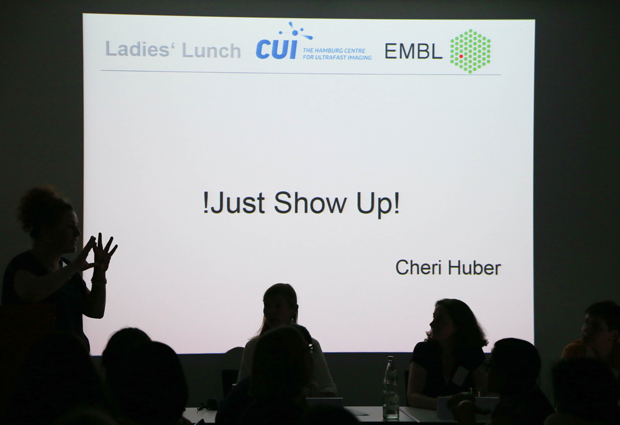
Opinion: Dealing with the imposter in me
Rosemary Wilson talks about imposter syndrome and how to handle it

I often have a terrible feeling that I do not deserve the recognition I get when I write a good story or take a great photo. It feels as if everyone has made a mistake and will suddenly wake up to the truth that I don’t know what I’m doing and will expose me for the fraud that I am. Hello, my name is Rosemary and I suffer from imposter syndrome.
Even though I’ve been working in science communication for several years and have acquired a range of experience, my inner imposter often holds me back from applying for jobs, or attending networking events – after all, I’m not a REAL communications expert am I?! I am often taken aback when people ask me for advice, because, well, I don’t have anything important to say do I?!
Everyone can suffer from these feelings of self-doubt, but they are recognised as disproportionally affecting women, and in particular women in senior positions. The lack of women in leadership roles in science is a matter for concern, and something that EMBL is actively working to address. Clearly there are many changes that need to be made by all members of the scientific community, but could imposter syndrome in women be part of the problem and if so what can we do to help ourselves, and those around us?
Could imposter syndrome in women be part of the problem and if so what can we do to help ourselves, and those around us?
Together with equality officer Marie Lutz at the Centre for Ultra-Fast Imaging (CUI) on the DESY campus, we decided to open this topic up for debate. As part of a Ladies’ Networking Lunch we invited three special guests to share their experiences and tips: Elspeth Garman of the University of Oxford, a guest professor at CUI; Arwen Pearson, professor at the University of Hamburg at CUI; and Katrin Teske-Temperton, coach at the University of Hamburg.

Listening to the lively, honest and candid stories from the wonderful women of our panel and audience it became clear to me that I really am my own worst enemy. I will never be cured, but being aware of the ways I slip myself up is a big step towards taming my inner imposter. Here is some advice from our panel that I will be trying to put into practice:
Support networks are important
I have some wonderful colleagues, friends and family members who regularly tell me how much they appreciate and value my work, who push me to push myself, who insist I apply for jobs that I don’t believe myself to be suitable for – they all help me to believe in myself a little bit more. This is so valuable and I am truly thankful for it (if not sometimes a little overwhelmed). I love to see people coming through EMBL flourish and go on to do great stuff; I hope I encourage people where I can, but I am sure there is more we can all do to build up support networks to help each other to fulfill our potential. As Arwen said, if your colleagues are doing great stuff, tell them.
Don’t belittle yourself
When asked what my job entails I’ll say something along the lines of, “Oh, I just write the odd little news article.” People who know my work will tell me this is a major understatement. Having been called out several times, I try to stop myself doing this. I have to overcome an urge to play down my work and my abilities and describe my work as it is: important and worthy of attention. As Elspeth said, stop ‘doing yourself down’.
Focus your thoughts
Thoughts of self-doubt and reflection are to a certain extent healthy and can help us to develop and acknowledge our boundaries, but we shouldn’t let them dominate. Katrin reminded us that we have the power to do something about that: next time I find myself in a puddle of self-doubt, I will try to refocus and fix on what I know I am good at.
Develop strategies
Katrin suggests making ‘done’ lists, not just ‘to Do’ lists; or collecting positive emails and reading them back when you’re not feeling too good about yourself. Everyone needs to find what works for them –maybe I’ll give these suggestions a whirl, but my friends and colleagues are my pick-me-up, who give me an honest talking to and a reality check. There are certain situations in academic life where it is particularly hard to keep the imposter in check. I remember the first time colleagues on the DESY campus asked for my advice as they started to set up their own communication activities; I was surprised that others actually listened to what I had to say and didn’t laugh in my face, and realised that I had actually acquired a lot of experience and knowledge during my time at EMBL. That experience did wonders for my self-esteem, but there have been other times when I have struggled to contribute to the discussion. Elspeth and Arwen reminded us we can all help to make it easier for others when we see someone struggling by bringing them into the conversation and reinforcing each other’s message, be it as part of an expert panel, or in a group meeting. Maybe it will also help me to remember that I am quite probably not the only one in that room wrestling with my inner imposter.
Be daring and allow yourself to fail
I know I need to be more daring and push myself out of my comfort zone more. How often have I kicked myself for not voicing my opinion at events, or taking part in a networking event? I’ll admit I feel comfortable on the sidelines cheering others on, but as Elspeth said that we need to have the courage to try for more, and while we’re at it, allow ourselves to fail. When I have pushed myself out there, I’ve often surprised myself and even when I haven’t landed my dream job, the experience has taught me something about my strengths or even opened other doors of opportunity. Which leads on nicely to the last point…
Just turn up
I think I will make this my mantra as I consider the next step in my career. After all, what can go wrong? I have plenty of experience under my belt, deep down I know I am good at what I do, I can do this, I will do this. Just turn up.


